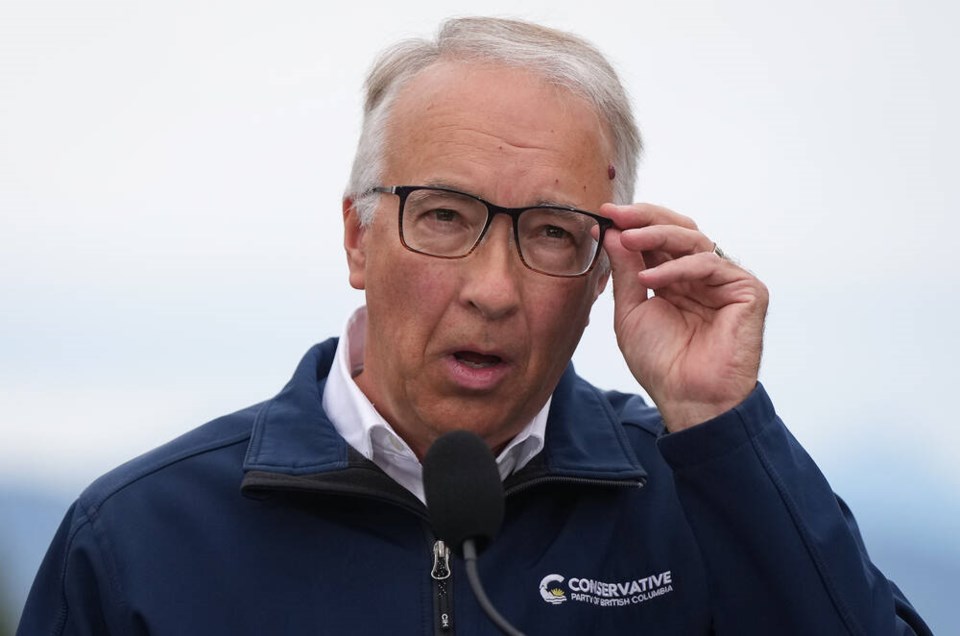Voters can now stack the three parties’ platforms side-by-side-side for comparison, following the release Tuesday of the Conservatives’ 100-page outline of where they would take B.C.
Two ranking business economists have already run some numbers on the costing of all the promises and concluded taxpayers are facing a period of austerity in the near future no matter who wins this Saturday.
A “stunning deterioration” in the B.C. government’s fiscal position under David Eby’s leadership is the main reason for their gloomy warning.
During the campaign, the fiscal picture is a no go zone for the NDP campaign. The only time it gets raised is in the context of “not a problem.”
Conservatives raise alarm about debt and deficits routinely, but the issue doesn’t resonate much in a campaign preoccupied by housing, health care and the drug crisis.
Ken Peacock and Jock Finlayson, with the BC Business Council and Independent Contractors and Businesses Association respectively, rapped both leaders for bypassing the issue.
“The increasingly parlous state of the province’s public finances points to a period of fiscal austerity in the years ahead. This painful prospect has been studiously ignored by the political parties in the election,” said the economists.
The NDP are ignoring it because the mountain of new debt in the last seven years is mostly their creation. A $2.5-billion surplus in 2017 has turned into a $9-billion deficit today. It’s partly due to the pandemic, but even a huge unexpected rebate from the federal government that materialized just as Eby took over in 2022 didn’t staunch the red ink.
The Conservatives recognize the problem, but tread lightly around how they would tackle it. The plan downplays the economists’ prediction that some austerity — meaning cuts in government programs and spending — will eventually become a necessity.
Leader John Rustad said their costing shows they can eliminate the current $9 billion yearly operating deficit in two terms — between five and eight years.
(That deficit grew by $1 billion in less than a year, and the fact both parties have promised huge tax cuts and dozens of new projects makes for an even steeper climb to get out of the red.)
The Conservative route out relies mostly on one central number — a projected growth rate of 5.3 per cent a year for the next several years. That’s a huge assumption given that it was under two per cent last year and averaged under three per cent over the past decade.
But plugging that number into the modelling is the easiest way to show a B.C. budget eventually balancing. Even after doing that, the Conservative platform acknowledges there would need to be cuts.
It promises a “reallocation of wasteful spending to priority areas…” and commits to a “core review” of government spending by way of a “taxpayer respect audit.”
A core review in 2001 by the BC Liberal government prompted widespread angst and a major shuffle of government priorities.
Rustad said one major cut — repealing the suite of Clean BC climate-change initiatives — would put $28 billion back into the economy by 2030.
Separate from the operating budget, the government is spending $20 billion a year on capital projects. Rustad wants a full review of the capital-spending plan to cut costs that arise from the NDP’s “closed shop” approach to labour contracts.
Even with balancing the budget in mind, Rustad would hike spending by $2.3 billion over the next two years to address 18 listed priorities.
The optimistic growth rate he’s relying will stem from a commitment to boost the economy on all fronts. “We need to get government out of the way so that people can invest in businesses and then pay higher wages.”
Eby said at a campaign stop that B.C. leads the big provinces in growth “and we can grow more.”
There is low unemployment and B.C. has the second lowest debt-to-GDP ratio in Canada, he said.
“If we don’t build [infrastructure] then conditions will degrade …”
BC Greens acknowledge the cost of their platform is “significant.” They outline spending hikes of $8 billion a year for three years on 20 priorities, some of them funded by an increase in the industrial carbon tax.
Eliminating deep poverty and ending homelessness would cost $3 billion a year, but the party said the price being paid for those problems is even higher.
>>> To comment on this article, write a letter to the editor: [email protected]



